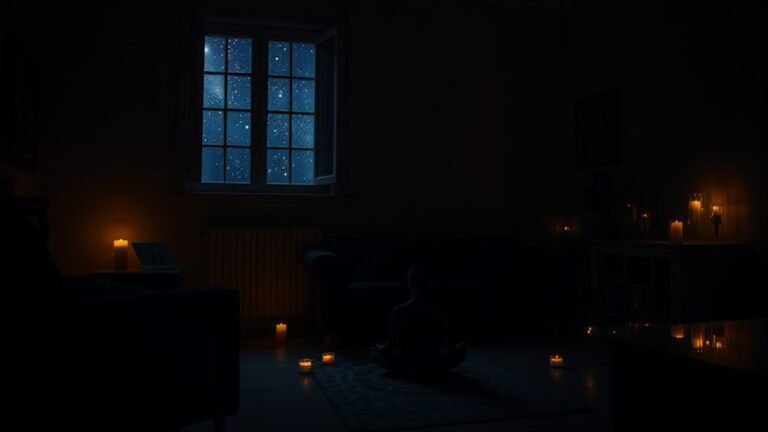10 Spiritual Meanings of Sore Throat
As we explore the spiritual meanings behind a sore throat, we might find ourselves reflecting on the deeper implications of this common ailment. Often, it symbolizes communication blockages or repressed emotions that we've yet to voice. It's intriguing to contemplate how this physical discomfort might signal an urgent call for self-assertion or a confrontation with unresolved conflicts. By understanding these connections, we can uncover pathways to healing that we might not have previously contemplated. So, what do these insights reveal about our own experiences and interactions?
In a Nutshell
- A sore throat may symbolize repressed emotions or unexpressed thoughts, indicating a need for better communication and authenticity.
- Physical discomfort in the throat area could reflect unresolved conflicts, urging individuals to address underlying emotional issues.
- Blockages in the throat chakra often manifest as sore throats, inviting exploration of unvoiced feelings and promoting healing.
- The sensation of a sore throat can signify a desire for self-assertion, encouraging individuals to express their needs and set personal boundaries.
- Emotional overwhelm and isolation may surface as physical symptoms like a sore throat, highlighting the importance of seeking connection and understanding.
Communication Blockages
Communication blockages often arise from unexpressed thoughts or emotions, leading to a feeling of constriction in our throats.
We've all felt that pang of frustration when our communication styles clash or when we struggle to articulate what's on our minds. It's as if our words are trapped beneath the surface, yearning to break free but held back by invisible barriers.
When we bottle up our feelings, it not only affects our verbal expression but can also manifest physically, like a sore throat.
Recognizing these blockages can be the first step toward healing. By creating a safe space for ourselves and others, we can encourage open dialogues where everyone feels heard.
It's crucial to embrace vulnerability and share our truths, no matter how uncomfortable that may feel at times. When we practice expressing ourselves authentically, we foster deeper connections and a sense of belonging.
Let's remind ourselves that our voices matter. By actively engaging in conversations and being mindful of our communication styles, we can dissolve those blockages together.
In doing so, we not only liberate our voices but also invite others to share theirs, creating a harmonious exchange of thoughts and emotions.
Repressed Emotions
When we think about the blockages in our communication, it often leads us to reflect on the emotions we keep tucked away. Repressed emotions can weigh heavily on us, manifesting not just in our throats but in our overall well-being.
We might feel the urge to speak but find ourselves stifled, unsure of how to articulate our true feelings. This disconnect can create a sense of isolation, making it even more challenging to connect with others.
By acknowledging these feelings, we open the door to emotional release. It's crucial to create spaces where we can express ourselves freely—whether through journaling, art, or sharing our thoughts with trusted friends.
Creative expression allows us to channel our repressed emotions into something tangible, helping us process and understand what we're experiencing.
Let's remember that we're not alone in this journey. We share the struggle of holding back and the desire to be heard.
Encouraging each other to embrace vulnerability can lead to profound healing. So, let's take that step together, allowing our voices to rise and fill the spaces that once felt silent.
Fear of Expression
In moments where our voices tremble with uncertainty, we often find ourselves grappling with a profound fear of expression. This fearful silence can feel suffocating, as if our words are trapped within, yearning for release. We might wonder what holds us back from embracing our expressive freedom.
Together, let's explore some common reasons behind this fear:
- Fear of Judgment: We often worry about how others will perceive our thoughts and feelings, which can stifle our voices.
- Past Experiences: Negative feedback or criticism from previous attempts at expressing ourselves can create barriers that seem insurmountable.
- Cultural Expectations: Societal norms sometimes dictate how we should or shouldn't express ourselves, leading to internal conflict.
- Self-Doubt: We may question our worth and the value of our opinions, leaving us hesitant to share.
As we acknowledge these barriers, we also recognize the importance of finding safe spaces where we can speak freely.
By confronting our fears, we begin to reclaim our voices, fostering a sense of belonging in a world that craves authenticity.
Let's commence on this journey together, embracing our right to express ourselves fully.
Need for Self-Assertion
Finding our voice is just the beginning; we also need to assert ourselves boldly in the world. It's not enough to speak our truth; we must stand firm in it. When we practice self-advocacy techniques, we empower ourselves to express our needs and desires without hesitation.
It's vital to recognize the importance of personal boundaries in this process. Establishing what we'll and won't accept allows us to create space for our authentic selves.
We often find ourselves in situations where we hesitate to assert our beliefs or needs, fearing disapproval or rejection. But when we embrace our right to express ourselves, we foster genuine connections with others.
Let's remind ourselves that our voices matter, and we deserve to be heard.
As we navigate our journeys, let's support one another in developing our self-assertion skills. We can practice setting boundaries, articulating our needs, and using self-advocacy techniques that resonate with us.
Together, we can create an environment where everyone feels valued and empowered to share their unique perspectives. By asserting ourselves, we not only honor our individuality but also contribute to a collective sense of belonging.
Unresolved Conflict
As we navigate our lives, unresolved conflict can manifest in physical ways, including a sore throat that signals our struggle to express what's bothering us. This discomfort often reflects deeper unresolved issues and emotional baggage we carry.
We might find ourselves feeling stuck, unable to voice our feelings or confront those conflicts directly.
Here are a few ways we can begin addressing these underlying tensions:
- Identify the Conflict: Let's take time to recognize what specific issues are causing us distress.
- Reflect on Our Emotions: It's essential to explore how these unresolved conflicts make us feel. Are we angry, sad, or frustrated?
- Communicate Openly: We should practice expressing our thoughts and feelings, even if it feels uncomfortable.
- Seek Support: Connecting with trusted friends or professionals can help us navigate these complex emotions.
Inner Critic Voices
Unresolved conflicts often lead us to internal battles, where the voices of our inner critic can become particularly loud. We may find ourselves trapped in a relentless cycle of self-judgment, questioning our worth and abilities. This inner dialogue can feel overwhelming, pulling us further away from our authentic selves and the connections we crave.
When we experience a sore throat, it might be our body's way of signaling that these critical voices are stifling us. Instead of expressing our true feelings and thoughts, we often internalize negativity, leading to both physical and emotional discomfort.
It's crucial to recognize that this inner critic isn't the voice of truth; rather, it's a reflection of past experiences and societal expectations.
Lack of Authenticity
When we suppress our true selves, it often manifests as a sore throat, signaling our struggle with authenticity. This discomfort invites us to reflect on our journey of identity exploration and the personal truths we hold within.
It's crucial to recognize that our voices deserve to be heard—both by ourselves and others.
Here are some ways we can embrace our authenticity:
- Reflect on Our Values: Let's identify what truly matters to us. When we align our actions with our core beliefs, we find strength in our voices.
- Express Our Feelings: Sharing our thoughts and emotions openly creates connections and fosters belonging, allowing us to feel seen and understood.
- Set Boundaries: Establishing healthy boundaries helps us protect our energy and maintain our authenticity without feeling guilty.
- Practice Self-Compassion: Let's be gentle with ourselves as we navigate our personal truths. This journey isn't always easy, but it's vital for our growth.
Spiritual Awakening
Suppressing our true selves often leads to physical manifestations like a sore throat, reminding us of the significance of authenticity. When we experience discomfort, it's often a signal, urging us toward spiritual growth and deeper self-awareness.
We may find ourselves at a crossroads, where our inner voice calls for recognition and expression. In this journey of spiritual awakening, we're encouraged to explore our emotions and beliefs, aligning our energy with our true essence.
It's essential to acknowledge that each sore throat can symbolize our struggle to voice our needs and desires. By embracing this discomfort, we can unravel the layers that keep us from fully expressing who we are.
As we navigate this path together, let's remind ourselves that it's okay to seek support. Engaging in practices that promote energy alignment—like meditation, journaling, or simply sharing our thoughts with trusted friends—can help us find our voice.
We're not alone in this; many of us are on the same journey, working toward authenticity and connection. Together, we can transform our struggles into opportunities for profound spiritual awakening, allowing our true selves to shine.
Desire for Connection
Sometimes, we all long for deeper connections with others, and this desire can manifest in various ways, including physical sensations like a sore throat. When we feel this discomfort, it might be our body's way of signaling a need for emotional intimacy and a shift in relationship dynamics.
Here are some signs that our desire for connection may be at play:
- Feeling Isolated: We may notice a growing sense of loneliness, even in a crowd.
- Difficulty Expressing Ourselves: Our throats may tighten when we try to communicate our feelings.
- Longing for Understanding: We might crave relationships where we feel truly seen and heard.
- Emotional Overwhelm: We can experience a mix of joy and sorrow when thinking about our connections.
Recognizing these signs can help us reflect on what we truly seek in our relationships.
It's important to honor this longing and take steps toward fostering deeper bonds. When we nurture our emotional intimacy, we create spaces where our voices can be heard, allowing our relationships to thrive.
Let's embrace this journey together.
Call for Healing
Our longing for deeper connections often reveals an underlying call for healing within ourselves. When we experience a sore throat, it can be more than just physical discomfort; it can signal a blockage in our throat chakra, the center of communication and expression. This discomfort invites us to explore our unvoiced feelings, fears, and desires.
In these moments, we can harness healing energy to support our journey. Let's acknowledge our emotions and the importance of speaking our truths. By doing so, we open pathways not just for our own healing but for deeper connections with others.
It's vital to create a space where we feel safe to express ourselves, and in that process, we may find that our throat chakra begins to balance. Together, we can engage in practices that nurture this energy center—like gentle throat chakra meditations, affirmations, or simply sharing our thoughts with trusted friends.
Frequently Asked Questions
Can a Sore Throat Indicate a Spiritual Awakening?
We often wonder if a sore throat can signal something deeper. It might reflect throat chakra imbalance, pointing to unexpressed emotions. Embracing this symbolism can guide us toward healing and a more authentic connection with ourselves.
How Can I Heal Spiritually From a Sore Throat?
To heal spiritually from a sore throat, we can focus on energy release and emotional detox. Let's express our feelings, practice mindfulness, and embrace self-care together, fostering connection and understanding in our journey toward healing.
Are There Specific Crystals for Throat Healing?
Absolutely, we love using throat stones like blue lace agate and aquamarine for their soothing crystal properties. They help us express ourselves and promote healing, creating a beautiful connection with our inner voice and community.
What Role Does Meditation Play in Throat Issues?
We believe meditation techniques, like deep breathing and visualization, help us connect with our voice. Incorporating throat affirmations can empower us, fostering healing and self-expression, reminding us we're not alone on this journey.
How Can I Enhance My Throat Chakra Energy?
To enhance our throat chakra energy, let's practice mindful breathing, express our truth, and engage in sound healing. Together, we can align our energies, fostering a deeper sense of connection and authenticity in our lives.

Sofia Phillips is a renowned spirituality expert and the visionary behind SoulfulCreature.com. With a compassionate heart and an enlightened mind, Sofia embarks on a quest to guide others through the realms of spirituality. Her approach is deeply rooted in providing a nurturing and positive experience, allowing individuals to explore and grow in their spiritual journey.







